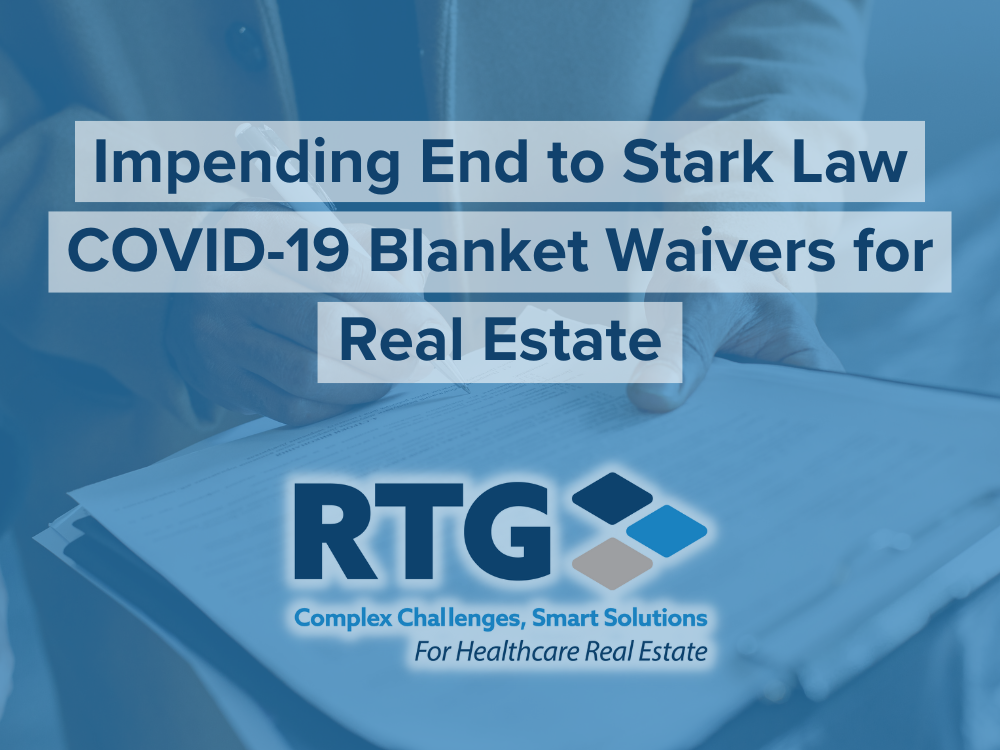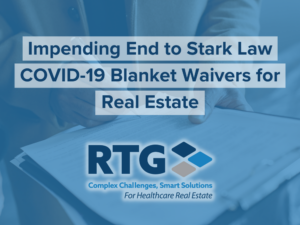
Impending End to Stark Law COVID-19 Blanket Waivers for Real Estate

Any time there are major updates to Stark Law and compliance regulations impacting healthcare organizations and their real estate portfolios, it can cause concern and uncertainty. The recent announcement by the Biden Administration that the Public Health Emergency would end on May 11, 2023, has caused necessary and required changes to certain modifications implemented during the pandemic to relax specific compliance requirements under Stark Law. This impending end to Stark Law COVID-19 blanket waivers has created many questions for healthcare executives.
These modifications, or blanket waivers, were created to apply to financial relationships and referral sources solely related to COVID-19 purposes. The blanket waivers allowed for a certain amount of flexibility for different types of arrangements with referral sources, including, but not limited to, real estate arrangements with referral sources, as described in more detail below. Blanket waivers under Stark Law for COVID-19 were issued in conjunction with the Centers for Medicare and Medicaid Services and the U.S. Department of Health and Human Services after both entities ruled blanket waivers were permissible during this national emergency.
Blanket waivers were a welcomed update to Stark Law during the chaos of COVID-19, but the extinguishing of these waivers will create necessary action for health systems across the country. Realty Trust Group understands that navigating these changes can be challenging, which is why our compliance team is here to help guide you through any uncertainty during this transition.
What Does the End of COVID-19 Blanket Waivers Mean for a Healthcare Organization’s Real Estate Compliance?
It is important to understand what this announcement means for your healthcare organization. Blanket waivers relaxed certain compliance requirements under Stark Law for different types of arrangements with referral sources, including, but not limited to, real estate lease arrangements. Absent the government’s determination of fraud or abuse, the following waivers may apply to real estate arrangements with referral sources:
- Rental charges paid by an entity to a physician (or an immediate family member of a physician) that are below fair market value (FMV) for the lease of office space or equipment.
- Rental charges paid by a physician (or an immediate family member of a physician) to an entity that are below FMV for the physician’s (or immediate family member’s) lease of office space from the entity.
- Remuneration from a physician (or an immediate family member of a physician) to an entity that is below FMV for the use of the entity’s premises or items or services purchased by the physician (or the immediate family member of the physician) from the entity.
- Remuneration from an entity to a physician (or the immediate family member of a physician) resulting from a loan to the physician (or the immediate family member of the physician): (1) with an interest rate below FMV; or (2) on terms that are unavailable from a lender that is not a recipient of the physician’s referrals or business generated by the physician.
- Remuneration from a physician (or the immediate family member of a physician) to an entity resulting from a loan to the entity: (1) with an interest rate below FMV; or (2) on terms that are unavailable from a lender that is not in a position to generate business for the physician (or the immediate family member of the physician).
- Referrals by a physician to an entity with whom the physician (or an immediate family member of the physician) has a compensation arrangement that does not satisfy the writing or signature requirement(s) of an applicable exception but satisfies each other requirement of the applicable exception, unless such requirement is waived under one or more of the blanket waivers set forth above.
Now that the Biden Administration has announced its intention to end the Public Health Emergency and, by extension, end the blanket waivers, healthcare organizations must resume their standard real estate compliance under the Stark Law. This means organizations must ensure that any real estate arrangements they have with other healthcare entities, including those previously arranged under blanket waivers, are in compliance with the requirements listed under Stark Law.
Learn about recent changes to the Stark Law and their impact on real estate arrangements with referral sources.
Download our white paper!
How Do Healthcare Providers Ensure Their Real Estate Arrangements Are Compliant with Stark Law by May 11, 2023?
Again, it is important to note that all real estate arrangements with referral sources must fully comply with Stark Law, as written, without blanket waivers commencing May 11, 2023. To ensure that your organization’s real estate portfolio is fully compliant, we recommend the following steps:
- Conduct a thorough review of your organization’s real estate arrangements: Healthcare organizations should review all real estate arrangements they have with other entities, including any that might also be connected with referral relationships, joint ventures, and ownership interests. This review should include all parties involved, as well as any financial benefits or compensation received, to identify which real estate arrangements may be impacted by the blanket waiver expiration.
- Evaluate your organization’s real estate compliance with Stark Law: Once you have identified these real estate arrangements, you should conduct an evaluation to determine whether they would be in compliance with Stark Law after May 11, 2023. This evaluation should encapsulate all elements of Stark Law, including healthcare real estate compliance requirements and FMV standards for real estate valuation reports.
Your organization should also ensure records of using the blanket waivers during the allotted time for real estate arrangements are well documented. Records should clearly state the terms of the waiver arrangement and the COVID-19 connection for using the waiver. - Address any noncompliant relationships: If any real estate arrangements are found to be noncompliant with Stark Law, it’s crucial that healthcare organizations take necessary steps to address them. This may include renegotiating terms, restructuring the arrangement, or terminating the arrangement altogether.
- Implement policies and procedures to ensure ongoing real estate compliance: To ensure ongoing compliance with Stark Law, healthcare organizations should implement policies and procedures to monitor and manage real estate arrangements with other entities. This may include regular reviews and audits, as well as training and education for staff and providers.
- Attend a real estate compliance training course: It is a good idea to attend annual real estate compliance training courses to ensure that you are staying up to date on new laws or regulations.
Preparing for the Expiration of COVID-19 Real Estate Blanket Waivers
While the announcement to end the Public Health Emergency and, by extension, the blanket waivers may cause concern, remember that with the right guidance, it is possible for your healthcare organization to be compliant with Stark Law while having real estate arrangements that are beneficial to your organization.
At RTG, our team is here to support your healthcare organization as you prepare for this important update to Stark Law and confirm your compliant status. Real estate compliance has continued to increase in complexity throughout the COVID-19 pandemic and its aftermath. We are committed to helping you navigate these changes with confidence and our years of experience in the healthcare real estate compliance space.
By taking a proactive approach and implementing policies and procedures to ensure ongoing real estate compliance, healthcare organizations can continue to provide high-quality patient care while adhering to requirements under Stark Law. RTG is here to partner with you and support your organization each step of the way.
If you have any questions or concerns about your organization’s real estate portfolio’s compliance under Stark Law and the upcoming end of the COVID-19 blanket waivers, connect with one of our team members today. We can conduct a compliance policy review with the upcoming Stark Law updates in mind to ensure your healthcare organization is prepared for May 11, 2023.
Want your compliance officers to stay up to date with Stark Law and other legal requirements for your real estate assets?
Purchase our On-Demand Healthcare Real Estate Training today.
These updates have an impact beyond real estate compliance and include other financial relationships. RTG partners with PYA to provide comprehensive compliance services across your entire healthcare organization. To learn more about general compliance under Stark Law, check out PYA’s recent webinar about preparing for the end of the COVID-19 Public Health Emergency.




